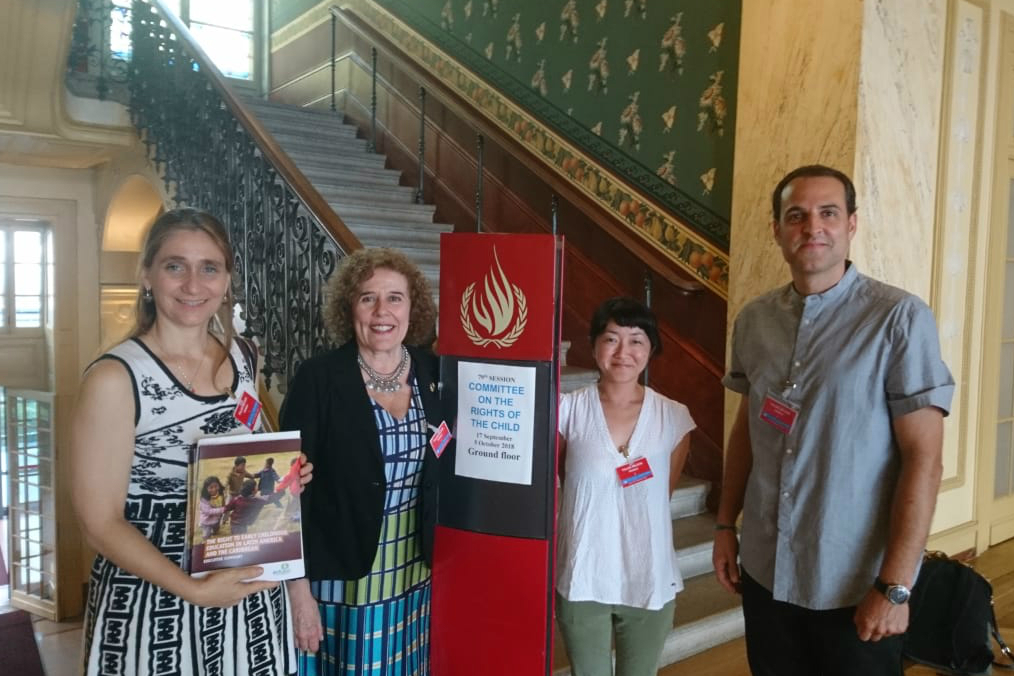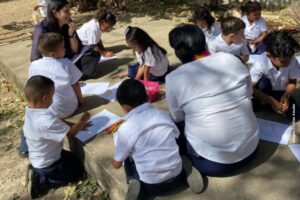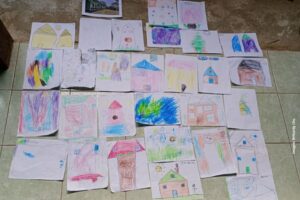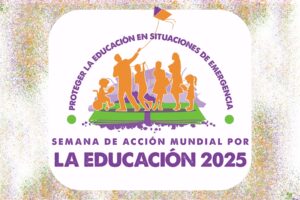Based on a study conducted in Latin America and the Caribbean, representatives of CLADE, OMEP and EDUCO presented challenges and recommendations
Representatives of the Latin American Campaign for the Right to Education (CLADE), the World Organization for Early Childhood Education (OMEP) – Regional Vice Presidency for Latin America – and the EDUCO Education and Cooperation Foundation participated on September 18th in a hearing at the Committee of the Rights of the Child of the UN, in Geneva, Switzerland. In this occasion, they defended the full realization of the Convention on the Rights of the Child (CRC), as well as the promotion of a coordinated, comprehensive and multisectoral approach to care and education in early childhood.
The proposals are the result of the study “The right to education and care in early childhood: perspectives from Latin America and the Caribbean”, a joint initiative of the organizations. The research reveals that, although the General Laws of Education in the region recognize education as a human right and the State as guarantor of its full exercise from early childhood, with different starting points, fragmentation and dispersion of the policies and practices for this educational stage persist, as well as the absence of adequate financing.
The need to deepen the relevance and priority of Early Childhood Care and Education (ECCE, conceived for children from 0 to 8 years of age) in the legal, political, budgetary and institutional frameworks is pointed out, so that they have a greater root in the best interests of the child and grant a greater protection to their rights. “We defend a comprehensive approach to care and education in early childhood from birth to 8 years, emphasizing its inherent value over the preparation for the next educational stages,” said Mercedes Mayol Lassalle, from OMEP.
This study demonstrates the insufficient development of state policies from birth to 3 years of life – which means that for many families and children early childhood education and care is still a privilege and not a right, further widening social gaps in an already unequal region such as Latin America and the Caribbean.
Likewise, insufficient coverage in the ECCE is identified and reported, which especially affects the more economically fragile social sectors, as well as an inadequate infrastructure for this educational stage in terms of security and accessibility for all. It is also pointed out that the gratuity of the ECCE is still not guaranteed for everyone in the region, and that there is still a need to advance in the formation and appreciation of teachers of this educational stage.
A concern expressed to the Committee it’s the growing tendency to focus on the successes of an academic nature, which also leads to the submission of increasingly small children to standardized tests, denying their rights of play, creativity, cooperation, self-confidence and autonomy. “This tendency goes against the principles of the CRC and its General Observations, in particular the principle of the evolution of the faculties of the child,” said Mikel Egibar, from EDUCO.
In this context, the organizations recommend: that the principles of the CRC inform, in a more comprehensive and coherent manner, the legal, political and budgetary frameworks related to education and care in early childhood; that the human right to education of children from birth to 3 years old is fully guaranteed; that forms of evaluation and educational models of ECCE are developed respecting the specific characteristics of this stage of life, as well as the concepts and purposes of education foreseen in the CRC; and the strengthening of public and universal early childhood education and care systems as a way to overcome inequalities and discrimination.
CLADE, OMEP and EDUCO urged the Committee to support the Member States in the realization of the right to education in early childhood, in dialogue with other relevant actors, developing guidelines for the articulation of their General Comments to the ECCE policies; and requesting reliable and solid information from the States of Latin America and the Caribbean, about how they are guaranteeing this right.
“We reassured to the Committee our commitment with the realization and progress of the right to education and care in early childhood in our region, and our willingness to continue collaborating and dialoguing in that regard,” said Camilla Croso, general coordinator of CLADE, at the close of the hearing.
Full study – The full investigation, entitled “The right to education and care in early childhood: perspectives from Latin America and the Caribbean”, will be launched virtually on October 18th, 2018, at 12h00 in Brazil (GMT -3), with a virtual seminar featuring Jorge Cardona Llorens, member of the UN Committee on the Rights of the Child, as well as other guests.
Download the Executive Summary:
The Committee on the Rights of the Child – It is a body of independent experts that oversees the implementation of the UN Convention on the Rights of the Child by its States Parties. The Committee also oversees the implementation of the optional protocols of the Convention, regarding the participation of children in armed conflicts and the sale of children, child prostitution and the use of children in pornography. All States Parties must submit periodic reports to the Committee about how they are implementing these rights. Initially, the States must submit a report two years after their admission to the Convention, followed by reports every five years. The Committee examines the reports and expresses its concerns and recommendations to the States Parties in the form of “final observations”.






